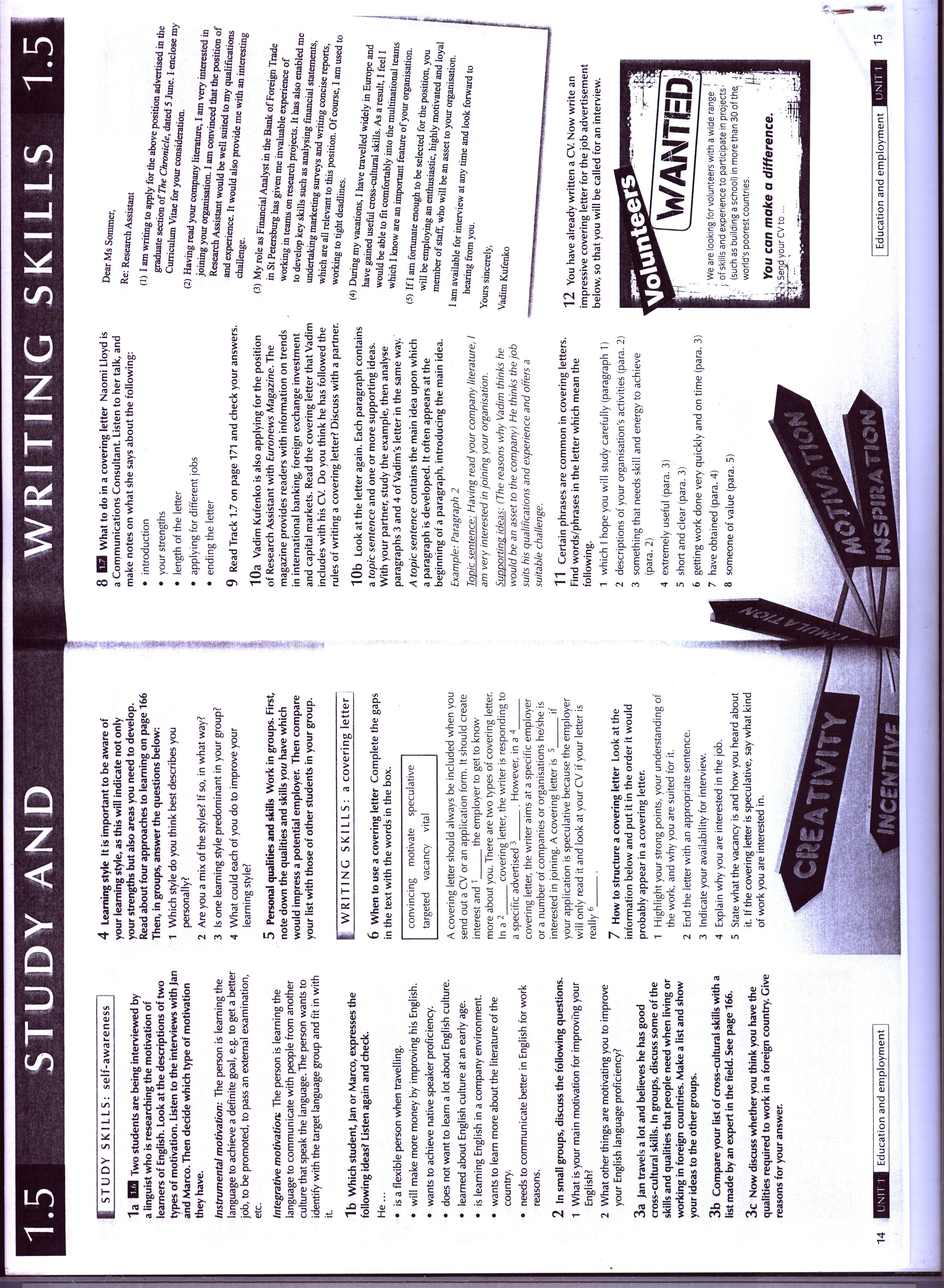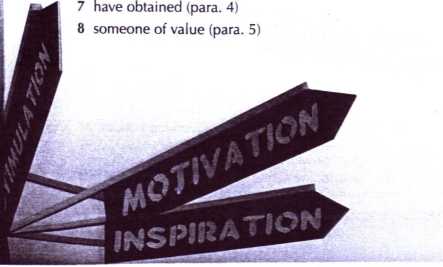82016 scan0010 (3)

1.5
STUDY AND
UNIT 1

| STUPY SKILIS: self-awareness
1 a EQ Two students are being interviewed by a iinguist who is researching the motivation of learners of English. Look at the descriptions of two types of motivation. Listen to the interviews with Jan and Marco. Then decide which type of motivation they have.
Instrumental motivation: The person is learning the language to achieve a definite goal, e.g. to get a better job, to be promoted, to pass an external examination, etc.
Integrative motivatiorL The person is learning the language to communicate with people from another culture that speak the language. The person wants to identify with the target language group and fit in with
it.
1b Which student, Jan or Marco, expresses the following ideas? Listen again and check.
He...
• is a flexible person when travelling.
• will make morę money by improving his English.
• wants to achieve native speaker proficiency.
• does not want to learn a lot about English culture.
• learned about English culture at an early age.
• is learning English in a company environment.
• wants to learn morę about the literaturę of the country.
• needs to communicate better in English for work reasons.
2 In smali groups, discuss the following questions.
1 What is your main motivation for improvi'ng your English?
2 What other things are motivating you to improve your English language proficiency?
3a Jan travels a lot and beiieves he has good cross-cultural skills. In groups, discuss some of the skills and qualities that people need when living or working in foreign countries. Make a list and show your ideas to the other groups.
3b Compare your list of cross-cultural skills with a list madę by an expert in the field. See page 166.
3c Now discuss whether you think you have the qualities required to work in a foreign country. Give reasons for your answer.
Education and employment j
4 Learning style It is important to be aware of your learning style, as this will indicate not only your strengths but also areas you need to develop. Read about four approaches to learning on page 166 Then, in groups, answer the questions below:
1 Which style do you think best describes you personally?
2 Are you a mix of the styles? If so, in what way?
3 Is one learning style predominant in your group?
4 What could each of you do to improve your learning style?
5 Personal qualities and skills Work in groups. First, notę down the qualities and skills you have which would impress a potential employer. Then compare your list with those of other students in your group.
| WRITING SKILLS: a covering letter
6 When to use a covering letter Complete the gaps in the text with the words in the box.
convincing motivate speculative targeted vacancy vital
A covering letter should always be included when you send out a CV or an application form. It should create
interest and 1_the employer to get to know
morę about you. There are two types of covering letter.
In a 2_covering letter, the writer is responding to
a specific advertised 3__However, in a 4_
covering letter, the writer aims at a specific employer or a number of companies or organisations he/she is
interested in joining. A covering letter is 5_if
your application is speculative because the employer will only read it and look at your CV if your letter is really 6__
7 How to structure a covering letter Look at the information below and put it in the order it would probably appear in a covering letter.
1 Highlight your strong points, your understanding of the work, and why you are suited for it.
2 End the letter with an appropriate sentence.
3 Indicate your availability for interview.
4 Explain why you are interested in the job.
5 State what the vacancy is and how you heard about it. If the covering letter is speculative, say what kind of work you are interested in.
WR
.5
8 ES What to do in a covering letter Naomi Lloyd is a Communications Consultant. Listen to her talk, and make notes on what she says about the following:
• introduction
• your strengths
• length of the letter
• applying for different jobs
• ending the letter
9 Read Track 1.7 on page 171 and check your answers.
10a Vadim Kufenko is also applying for the position of Research Assistant with Euronews Magazine. The magazine provides readers with information on trends in international banking, foreign exchange investment and Capital markets. Read the covering letter that Vadim includes with his CV. Do you think he has followed the rules of writing a covering letter? Discuss with a partner.
10b Look at the letter again. Each paragraph contains a topie sentence and one or morę supporting ideas. With your partner, study the example, then analyse paragraphs 3 and 4 of Vadim's letter in the same way.
A topie sentence contains the main idea upon which a paragraph is developed. It often appears at the beginning of a paragraph, introducing the main idea. Example: Paragraph 2
Topie sentence: Having read your company literaturę, / am very interested in joining your organisation.
Supporting ideas: (The reasons why Vadim thinks he would be an asset to the company) He thinks the job suits his qualifications and experience and offers a suitable challenge.
Dear Ms Sommer,
Re: Research Assistant
(1) I am writing to apply for the above position advertised in the graduate section of The Chronicie, dated 5 June. I enclose my Curriculum Vitae for your consideration.
(2) Having read your company literaturę, I am very interested in joining your organisation. I am convinced that the position of Research Assistant would be well suited to my ąualifications and experience. It would also provide me with an interesting challenge.
(3) My role as Financial Analyst in the Bank of Foreign Trade in St Petersburg has given me mvaluable experience of working in teams on research projeets. It has also enabled me to develop key skills such as analysing financial statements, undertaking marketing surveys and writing concise reports, which are all relevant to this position. Of course, I am used to working to tight deadlines.
(4) During my vacations, I have travelled widely in Europę and have gained useful cross-cultural skills. As a result, I feel 1 would be able to f5t comfortably into the multinational teams which I know are an important feature of your organisation. |
(5) If I am fortunate enough to be selected for the position, you will be employing an enthusiastic, highly motivated and loyal member of staff, who will be an asset to your organisation.
I am available for interview at any time and look forward to hearing from you.
Yours sincerely,
Vadim Kufenko

11 Certain phrases are common in covering letters. Find words/phrases in the letter which mean the following.
1 which I hope you will study carefully (paragraph 1)
2 descriptions of your organisation's activities (para. 2)
3 something that needs skill and energy to achieve (para. 2)
4 extremely useful (para. 3)
5 short and elear (para. 3)
6 getting work done very quickiy and on time (para. 3)
12 You have already written a CV. Now write an impressive covering letter for the job advertisement below, so that you will be called for an interview.
WANTO
——j
: We are looleing forvolunteers with a wide rangę ' j of skills and experience to participate in projeets ■ (such as building a school) in morę than 30 of thą; 4 j ' world's poorest countries. ||f
You eon make a difference.
fc^t^Send your CV to ...
Education and employment
15
i
I
Wyszukiwarka
Podobne podstrony:
FACULTY OF YETERINARY MEDICINE Wrocław University of Environmental and Life Sciences POLAND SELF EVA
numagement 1.1 O marketing The fifth and highest category concerns self-actualization needs: the des
scan0018 (7) PETROLEUM AND INDMDUAL POLYCYCLIC AROMATIC
Programowanie i testowanie jednostkowe (Programming and Unit Testing) ► Projekt
00130 Ld811c783a010c7cfdfc60f3fb2ac01 131 Optimization and Sensitivity Analysis were aliased with o
Students are obliged to book the guest rooms early and to pay a returnable deposit of 500PLN to the
Scan0080 (11) czas na przerwę”. Podchodzi do tablicy i mówi do studenta IC. J.: „Za nieprzygotowanie
Slajd16 6 State and localgovernment In Qatar, television camera s are being inserted into water and
EPIA 2011 ISBN: 978-989-95618-4-7 once and then evaluates them. Some well-known partitioning methods
Assessing during classes, participation and fitness tests: P_W01, PU01, P U02 P U03. P_K01 Student
193 Vol. 36(2), 2001 The jaws consisting of two plates are found in all examined species of cerithio
więcej podobnych podstron